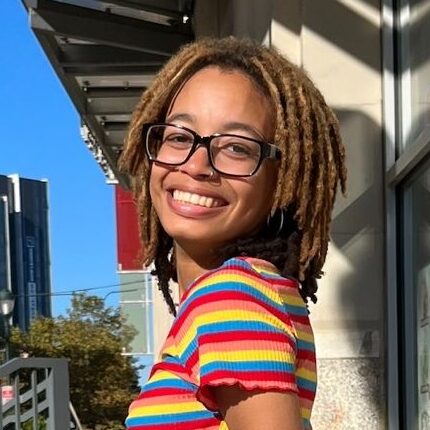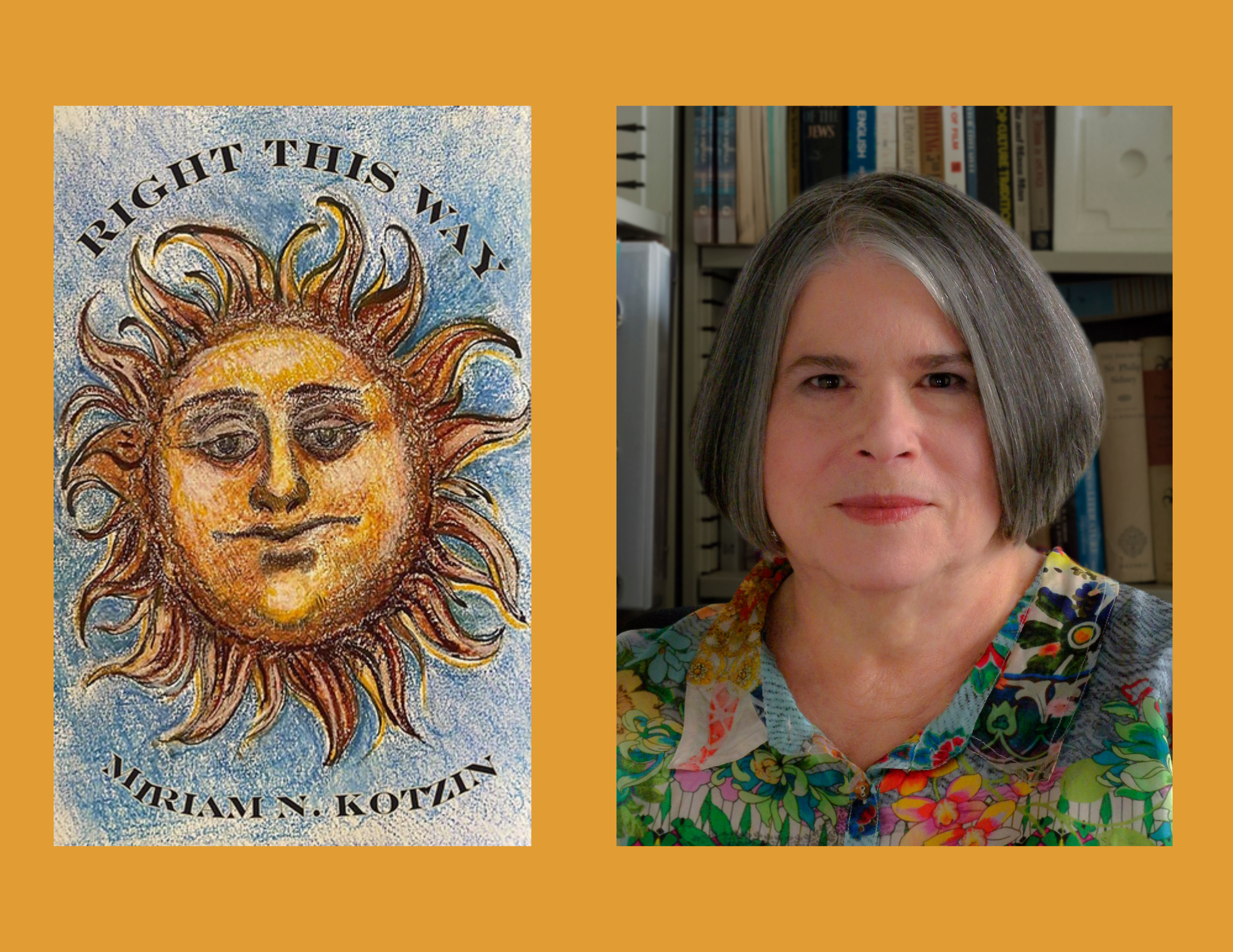Dr. Miriam N. Kotzin is a Philadelphia-based author who teaches literature and creative writing at Drexel University. She has written and published novels, short fiction, flash fiction, and poetry. Some of her published works include The Body’s Bride, The Real Deal, and her most recent novel, Right This Way.
Zipporah Fulmore: What sparked you to write Right This Way?
Miriam Kotzin: A flash. Flash fiction, that is. I wrote a flash about Ely Cutter, a middle-aged Jewish man, who was weeding his pole beans, looks up from weeding, and sees God’s face in the cloudless sky. He tells his wife, Lynne, what happened, that the face looked like a terra cotta garden ornament, and she leaves him in the kitchen so she could get her hair done. I didn’t want to leave him there.
Even a cut-rate vision’s enough to disturb your equilibrium, and in a small town where people gossip? More so. Ely was certain about what he’d seen, less clear about what he was obligated to do, what changes he should make—changes such as how he treats Lynne. Lynne’s not so bad a wife as she first seems, and in the past Ely had been unfaithful. Though that relationship was over, when his former mistress, Eleanor, hears about his vision, she tries to start things up again. Also, Ely, a real estate broker, has a flirtatious new client, an attractive divorcée, named Grace. Anyway, Ely was in so much trouble!
Fortunately, trouble sometimes can be funny. And that mixture, well, I just kept writing. After a couple of weeks, I had to face it: the flash, if I kept on with it, would be a novel. So that’s how Right This Way started.
ZF: Did you experience any difficulties when writing Right This Way?
MK: Oh yes. After a while I knew how the novel would end. But then it was as though somebody had poured super glue into my keyboard. Nothing. I wanted one thing and the characters, well, they were going to say what they were going to say, go where they were going to go. It was a battle of wills. The stronger won—that is, I relented and the keyboard worked.
That’s not to say that I didn’t do a lot of rewriting and editing. But I left it alone for a long while and worked on other things in between.
ZF: Do you think you’ll write another novel after this?
MK: Maybe. I have a couple of ideas, but before I settle in on another long commitment, I have plans to do some shorter fiction and poems.
ZF: What are your favorite projects you’ve written or worked on?
MK: Right This Way and an earlier novel The Real Deal along with A History of Drexel University I’d call “projects” (especially the history). I wouldn’t want to have to point to a poem or story and call it a favorite—and the process of writing, the intensity of it feels about the same whether it’s poetry or fiction.
ZF: How has your writing developed since you first started?
MK: When I started writing poetry, my poems were all free verse and short—often about five lines. For a few years I was strongly influenced by the symbolist poets, but I moved away from that. After I started teaching at Drexel I set about learning how to write in forms, which, I think, improved my free verse. I’m so grateful for computers—endless fiddling with line breaks without retyping an entire page! Equally happy for that help with fiction. I can edit without retyping an entire manuscript. I started writing traditional short stories and then learned how to write flash fiction, which, when I began, was in peril of being mistaken for a prose poem, not that there’s anything wrong with that. The discipline of incorporating character, dialogue, setting, and plot into a flash with strict word limits has helped me write better fiction, to keep things happening on every page.
ZF: You’ve written and published short stories, novels, and poetry, but is there a form you prefer?
MK: I used to think of myself as a poet who also wrote fiction, but that changed about twenty years ago. If what I want to write needs what I call elbow room, I’ll write fiction. But as often as not, I’ll tell—or suggest—a story in a poem. A lyric poem might have implied backstory. I also write short autobiographical creative non-fiction.
ZF: How do you think your identity and life experiences influenced your writing?
MK: At this point it probably goes both ways. Writing, wanting to get things right, makes me want to sharpen my perceptions, notice idiosyncrasies including my own.
It’s been at least 20 years since I was “a woman of a certain age,” and so it’s unlikely that any of my characters will ever be drunk texting. I grew up in a small town in South Jersey, and that social and physical landscape shows up in my fiction and poetry, including the gardens in Right This Way.
I wouldn’t have written The Real Deal if I hadn’t been interested in politics. I finished that novel in 2011, and I was astounded when one thing after another actually happened.
ZF: What’s it like teaching creative writing to students at Drexel?
MK: It’s exciting—and a challenge with the quarter system. The students in a creative writing class may be English majors, or writing minors, or taking the Certificate Program in Writing and Publishing, or they may be engineers or business students who have been waiting to take a course in creative writing. Many of our students have been writing poetry and fiction long before they ever take a creative writing course. We’re blessed with bright, talented, and highly motivated students. Chimamanda Ngozi Adichie is probably the most famous of my former students, but I regularly see poets and fiction writers with great potential for success.
ZF: Do you have any advice for new writers?
MK: It’s the common advice: read widely and with attention. Read to take apart the clock, so you can make one of your own. Go to writers’ workshops. If you attend readings regularly, you’ll become a member of the local literary community. Join a regular writers’ workshop wherever you live or online.
Some warnings. You will always have competing demands on your time. Something will suck up every moment you need for writing—if you let it. Protect your writing time. Revise, but keep your early drafts. Don’t throw away things you wrote when you were younger and less skilled. You’ll never be that age again—keep it as a record the same way you’d keep a photograph of someone you love. Smile all day, if it suits you, and say “please” and “thank you,” but write what’s important to you. Be courageous—not hostile, courageous—and above all, be fierce.
Miriam N. Kotzin’s new novel, Right This Way, can be purchased online from Amazon here.

Zipporah Fulmore is a third-year student at Drexel University pursuing a BA in English with a concentration in writing. When she’s not at work or school, you can find her reading, watching reality TV shows on Netflix, or trying new foods in the city. She has a never-ending sweet tooth and is always down to grab some boba or any sweet treat. She enjoys riding her bike on a cool spring day or going on a walk with friends.
